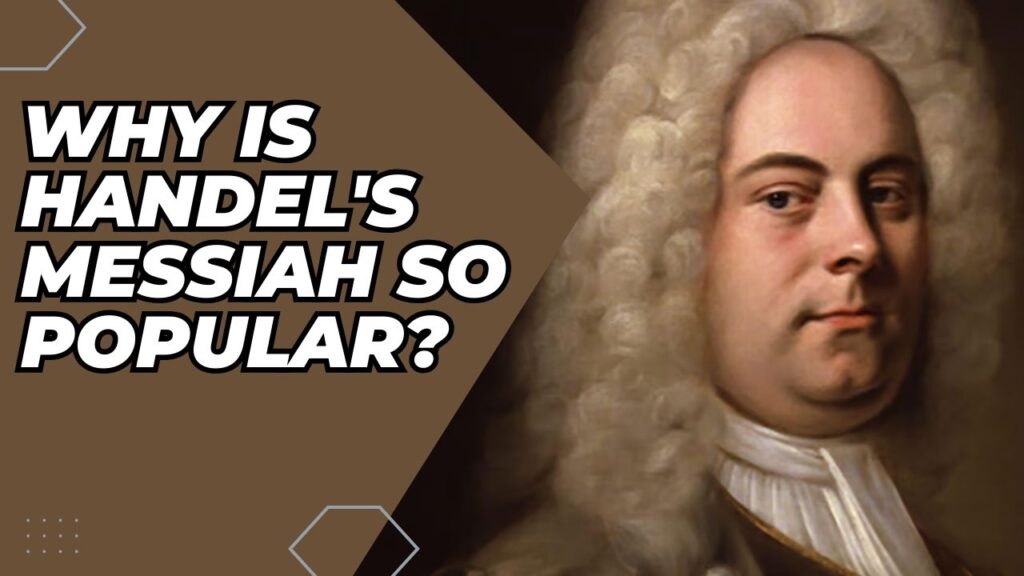Last updated on December 29th, 2024 at 11:43 am

Why Is Handel’s Messiah So Popular? Handel’s Messiah remains popular for its beautiful melodies and profound emotional resonance, offering comfort and inspiration.
Have you ever experienced the sheer power of Handel’s Messiah? Whether you’ve heard it performed live during the holiday season or listened to a recording, this iconic piece of music has a way of moving listeners, generation after generation.
Its timeless melodies, profound emotional depth, and association with holiday traditions have made it one of the most beloved choral works in history. But what is it about Messiah that continues to captivate audiences after more than 280 years?
Let’s explore why Handel’s Messiah remains as relevant and beloved today as it was at its premiere in 1742. [Why Is Handel’s Messiah So Popular?]
Table of Contents
What Is Handel’s Messiah?
Handel’s Messiah is one of the most famous and widely performed choral works in Western music.
Composed by George Frideric Handel in 1741, Messiah is an oratorio that primarily tells the story of the life of Jesus Christ, from his birth to his resurrection.
Unlike many other compositions of the era, Messiah stands out due to its accessibility, emotional depth, and the grandeur of its musical arrangements.
Handel, a German-British composer, crafted Messiah in just a few weeks, which has only added to the mystique of the piece. [Why Is Handel’s Messiah So Popular?]
Despite its initial lukewarm reception, the oratorio has grown to be one of the most enduring and influential works in the classical canon.
Now, let’s explore the reasons behind its continued popularity.
7 Reasons Why Handel’s Messiah Is So Popular?
1. Timeless Message and Universal Appeal
One of the key reasons Messiah has remained popular for centuries is its timeless and universal message. The oratorio focuses on themes of redemption, faith, and hope.
Its retelling of Christ’s life, death, and resurrection appeals to people from various religious and cultural backgrounds. [Why Is Handel’s Messiah So Popular?]
Its central message of salvation, delivered with majestic choral passages and poignant arias, resonates with audiences not just as a religious text but also as a celebration of the human condition.
The biblical text woven throughout Messiah speaks to universal human experiences such as suffering, joy, and the quest for meaning, making it relevant across generations.
2. Musical Mastery
Handel’s skill as a composer is undeniable in Messiah. He blends dramatic choral movements with delicate solo arias, creating an emotional journey for the listener.
The piece is known for its inventive use of counterpoint, which adds complexity to the music while maintaining a sense of clarity. [Why Is Handel’s Messiah So Popular?]
Messiah also demonstrates Handel’s flair for orchestration, where he expertly uses strings, woodwinds, and brass instruments to create a vibrant sound that evokes the joy and reverence of the text.
Furthermore, many pieces, such as the famed “Hallelujah Chorus,” remain iconic in the classical world, with Handel’s expert musical arrangements giving them enduring power.
3. Famous “Hallelujah Chorus”
The “Hallelujah Chorus” is arguably the most recognizable part of Messiah, and it stands as one of the most iconic pieces of choral music in Western culture.
Its uplifting message, combined with Handel’s majestic composition, has made it a centerpiece of celebrations, especially during the Christmas season.
The tradition of standing during the performance of the “Hallelujah Chorus,” believed to have been inspired by King George II‘s spontaneous standing ovation during a performance, further elevates its significance.
The chorus’s sheer power, coupled with the beauty of its vocal harmonies and the sweeping orchestral arrangement, ensures that it is a moment of awe for audiences every time it is performed.
4. Cultural Tradition and Holiday Performances
Messiah has become a cultural tradition, particularly during the Christmas season. Its popularity is often linked to the holidays, with performances of the oratorio becoming an essential part of Christmas celebrations around the world.
This tradition has helped Messiah maintain its place in both religious and secular spheres, as it is enjoyed by both Christian and non-Christian audiences alike.
The work’s association with the Christmas season, with its joyful themes of hope and divine intervention, ensures that it is performed annually by countless choirs, orchestras, and ensembles, especially during Advent and Christmas services.
This repeated exposure has cemented Messiah as a staple of classical music performances and holiday traditions. [Why Is Handel’s Messiah So Popular?]
5. Accessibility and Audience Engagement
Despite its complexity, Messiah is considered more accessible than many other classical works. [Why Is Handel’s Messiah So Popular?]
The oratorio’s mixture of recitatives, arias, and choruses allows for a dynamic listening experience, with something for every type of music lover.
The work’s choral sections are engaging, even for those without deep classical music knowledge, while the arias provide emotional depth that connects with the audience on a personal level.
Furthermore, Messiah is often performed by various choirs, ranging from amateur to professional, which helps make it accessible to a broad spectrum of performers and listeners.
This accessibility ensures that Messiah continues to be loved by both classical music enthusiasts and casual listeners.
6. The Legend of Its Creation
The story of Messiah‘s composition has become legendary. Handel wrote the entire work in a burst of inspiration in just 24 days, a feat that adds an air of mystique to the piece.
It is said that Handel was so moved by the text and the divine inspiration he felt that he barely ate or slept during this time. [Why Is Handel’s Messiah So Popular?]
This legend has contributed to the sense of reverence surrounding Messiah, as people often marvel at the speed with which Handel composed such a monumental work.
The myth of his divine inspiration has further added to Messiah‘s appeal, drawing listeners in with the notion that the work is not only a masterpiece but a product of divine guidance.
7. Historical Legacy and Enduring Popularity
Messiah has endured through the centuries not only because of its musical brilliance but also due to its cultural and historical impact.
Over the years, it has been performed by the greatest orchestras and choirs, including the London Symphony Orchestra and the Vienna Philharmonic, becoming an integral part of Western music’s rich heritage.
Its influence extends beyond the concert hall, as it has inspired countless musicians, conductors, and composers, ensuring its place in the classical music canon.
The fact that Messiah continues to be performed regularly around the world—whether in large concert halls, churches, or community gatherings—testifies to its timeless relevance.
See more: Why Is Baseball So Popular In Japan?
Conclusion: Why Is Handel’s Messiah So Popular?
So, what is it that makes Messiah so enduring? It’s the perfect combination of Handel’s musical genius, the timeless relevance of its themes, and the deep emotional connections it fosters.
This masterpiece has withstood the test of time, continuing to captivate audiences more than two centuries after it was first performed. [Why Is Handel’s Messiah So Popular?]
Its adaptability to different performance styles, along with its strong ties to holiday traditions, ensure that Messiah will remain a part of our cultural fabric for years to come. [Why Is Handel’s Messiah So Popular?]
If you’ve never had the chance to experience Messiah live, now is the time. Whether you’re attending a performance during the holidays or discovering a new recording, Messiah has something to offer every listener.
Its beauty, emotional depth, and universal message make it a work worth revisiting again and again. [Why Is Handel’s Messiah So Popular?]
FAQs
When was Handel’s Messiah first performed?
Messiah premiered in Dublin on April 13, 1742. The performance was a resounding success, and the oratorio quickly became a favorite across Europe.
Why is the “Hallelujah Chorus” so famous?
The “Hallelujah Chorus” is one of the most recognizable and powerful sections of Messiah. Its grandeur, dramatic harmonies, and triumphant lyrics have made it a symbol of joy and celebration.
What are the main themes of Messiah?
The primary themes of Messiah are hope, redemption, and divine joy. The work explores the life, death, and resurrection of Christ, offering a message of salvation and triumph over suffering.
How long does a performance of Messiah last?
A full performance of Messiah typically lasts about two and a half hours, including an intermission. The oratorio is usually performed in three parts, with a choir, orchestra, and soloists.
Is Messiah only performed at Christmas?
While Messiah is often associated with Christmas, it is also performed during Easter and at other times of the year. Its themes of redemption and salvation make it relevant for various occasions.

Ayla Herring loves blogging and enjoys writing about entertainment, celebrities, food, and business. He uses his knowledge of different topics to create interesting and helpful content for his readers.
